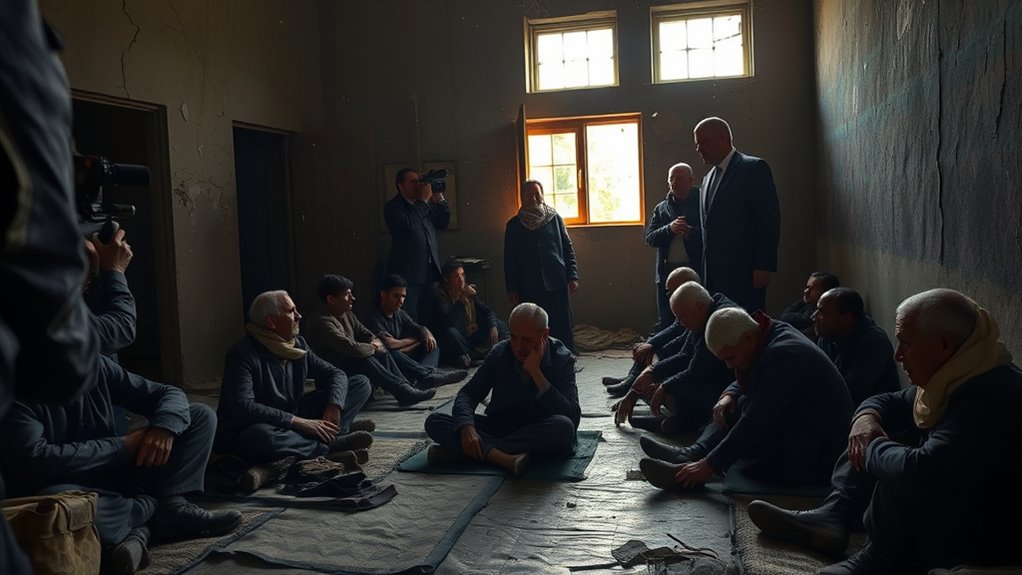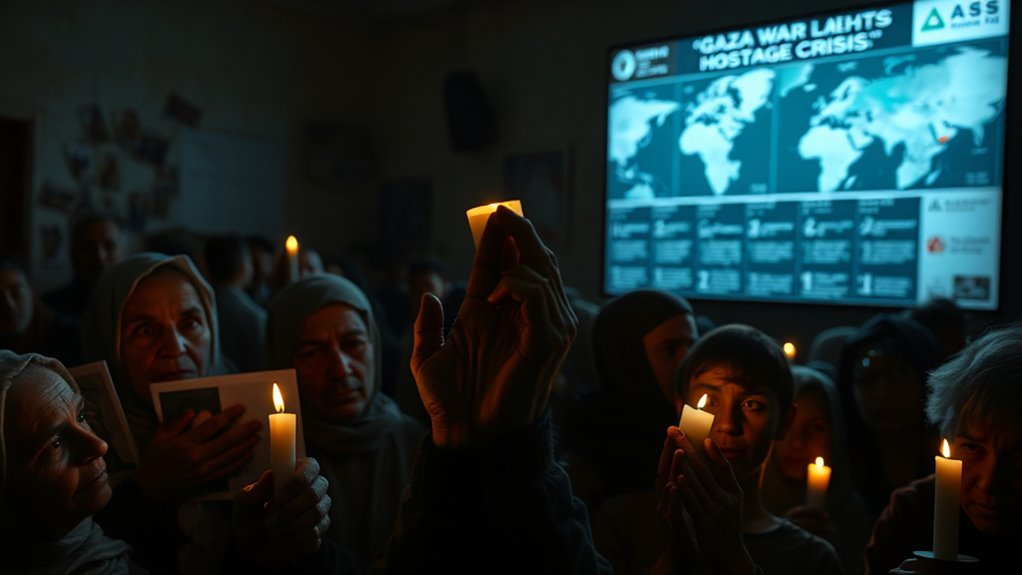Since October 2023, the Gaza War hostage crisis has escalated, with Hamas capturing soldiers and civilians, including women, children, and the elderly. International efforts from Egypt, Qatar, and Turkey aim to negotiate ceasefires and secure hostages’ release, though obstacles remain. Diplomacy, humanitarian aid, and negotiations are ongoing amidst fierce fighting and deteriorating conditions for hostages and civilians. If you continue exploring, you’ll uncover more details about the evolving situation and global responses.
Key Takeaways
- The crisis began in October 2023 with Hamas capturing civilians and soldiers during the Gaza conflict escalation.
- Hostages include women, children, and elderly, with conditions inside Gaza worsening amid shortages and violence.
- International mediators like Egypt, Qatar, and Turkey are working on ceasefires and humanitarian corridors.
- Diplomatic efforts involve discreet negotiations, but mistrust and ongoing hostilities hinder breakthrough solutions.
- The crisis highlights the urgent need for renewed diplomacy and international cooperation to free captives and restore stability.

The Gaza War Hostage Crisis has intensified as armed groups in Gaza have taken numerous civilians and soldiers hostage amid ongoing conflict. This escalation has deepened the urgency for international intervention and heightened global concern. The crisis began to unfold sharply in early October 2023 when Hamas launched a surprise attack on Israeli border communities, capturing soldiers and civilians in the chaos. In response, Israel declared a state of war, launching extensive military operations aimed at dismantling militant infrastructure and rescuing hostages. Over the subsequent days, reports emerged of dozens of hostages being held in Gaza, including women, children, and elderly individuals, some reportedly taken from homes and hospitals. The situation remains fluid, with conflicting reports about the number of captives and their conditions.
Armed groups in Gaza have taken numerous civilians and soldiers hostage amid ongoing conflict.
As the crisis deepened, international efforts to broker a resolution gained momentum. Countries like Egypt, Qatar, and Turkey called for calm and proposed mediating channels to secure the release of hostages. Egypt, sharing a border with Gaza, played a *vital* role, attempting to negotiate temporary ceasefires and providing humanitarian corridors. However, these efforts faced numerous obstacles, including ongoing hostilities and mistrust between parties. The United Nations also issued statements condemning the hostage-taking and urging all sides to prioritize civilian safety. Diplomatic channels, including backdoor negotiations and discreet contacts, became more active as the crisis dragged on, but tangible breakthroughs remained elusive. Efforts to facilitate negotiations have continued despite the complex challenges involved.
Meanwhile, families of hostages worldwide have been rallying for action, demanding that governments intensify efforts to free their loved ones. Humanitarian organizations have expressed concern over the deteriorating conditions inside Gaza, where hostages and civilians alike face shortages of food, medicine, and safe shelter. International pressure has increased on Israel to avoid excessive use of force that might endanger captives, while Hamas and other groups faced criticism for their tactics and the risks posed to those they hold. Despite these efforts, the hostage crisis remains unresolved, with hopes for a peaceful resolution tempered by ongoing violence and political complexities.
Throughout the crisis, media coverage has kept global audiences informed but also amplified the emotional toll on families and communities affected. The timeline of events continues to evolve, with each day bringing new developments, negotiations, and setbacks. The international community remains committed to finding a solution, but the path forward is uncertain. The hostage crisis underscores the broader human cost of the Gaza conflict, revealing the urgent need for diplomacy, restraint, and renewed efforts to protect innocent lives amid one of the most intense periods of violence in recent history.
Frequently Asked Questions
What Are the Long-Term Psychological Effects on Hostages?
You might experience long-term psychological effects like post-traumatic stress disorder, anxiety, depression, and trust issues. You could find it difficult to reconnect with loved ones or feel safe in everyday situations. Nightmares, flashbacks, and emotional numbness might persist long after you’re freed. It’s important to seek professional help to process these feelings, as recovery can be a slow, challenging journey but is possible with support and therapy.
How Do International Laws Regulate Hostage Negotiations?
International laws, like the Geneva Conventions, regulate hostage negotiations by emphasizing humane treatment and discouraging coercion. For example, in 2014, the International Committee of the Red Cross facilitated negotiations to secure hostages’ release, ensuring compliance with legal standards. These laws guide negotiators to prioritize safety, prohibit torture, and promote peaceful resolution, helping protect hostages’ rights while encouraging states to follow ethical procedures during crises.
What Role Do NGOS Play in Hostage Rescue Efforts?
NGOs play a vital role in hostage rescue efforts by acting as mediators, providing humanitarian aid, and offering support to victims’ families. You might see NGOs facilitating communication between captors and negotiators, advocating for safe releases, and assisting in psychological recovery. Their impartial presence helps build trust, encourage dialogue, and guarantee that humanitarian concerns remain central, ultimately supporting rescue operations and helping to secure the safe release of hostages.
How Do Media Outlets Influence Hostage Crises?
Media outlets influence hostage crises by shaping public opinion and pressuring governments to act. You see coverage that can rally support for rescue efforts or heighten political tensions. When stories are widely shared, they can motivate negotiators or complicate operations, especially if sensitive details are leaked. Media’s portrayal impacts how the public perceives the crisis, often influencing diplomatic responses and the urgency of rescue missions, making their role powerful and sometimes unpredictable.
What Are the Economic Impacts on Gaza Due to the Crisis?
You notice how the crisis devastates Gaza’s economy, causing unemployment to soar and local businesses to shut down. The blockade and ongoing violence restrict trade and access to essential goods, leading to inflation and poverty. You feel the ripple effects, as families struggle to survive amidst shortages. The economic slide deepens, making recovery harder, and perpetuating a cycle of hardship that affects every aspect of daily life in Gaza.
Conclusion
As you follow this ongoing crisis, remember that each delay deepens the pain for hostages and their families. Imagine a family waiting anxiously, hoping for their loved one’s safe return, only to face setbacks. For instance, in a hypothetical case, diplomatic efforts might be stalled by political disagreements, prolonging suffering. Your awareness and support can help push for continued international pressure and humanitarian solutions, aiming for a future where such crises are resolved swiftly and compassionately.










